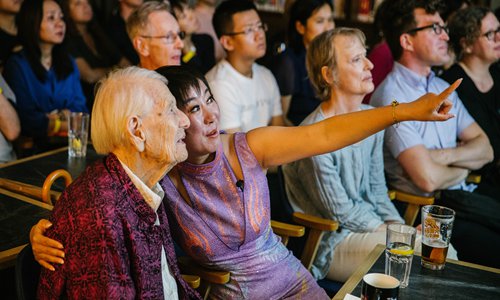103-year-old educator Isabel Crook’s legendary life in China
By Liu Zhongyin Source:Global Times Published: 2019/9/9 17:48:39

Isabel Crook (left) and Fu Han attend the screening of Isabel Brown Crook: An Anthropologist in China - Childhood Memories from Bailuding in Beijing on August 20. Photo: Li Hao/GT
As the guests, both foreigners and Chinese, young and old, stood up swiftly in the packed lecture room of a bookstore in downtown Beijing, they looked on respectfully as the 103-year-old elderly lady who was the star of the documentary they just watched was escorted from the room by her companions.
The elderly woman was Isabel Crook. Born in Chengdu, Southwest China's Sichuan Province, to a Canadian missionary family in 1915, Crook came into the world during a time when World War I was raging in Europe and China's last emperor Puyi was still living in the Forbidden City after abdicating three years earlier. Living in China throughout the years, Crook has stood witness to the multitude of shifts Chinese society has undergone over the past century.
Like Fu Han, producer of the documentary Isabel Brown Crook: An Anthropologist in China - Childhood Memories from Bailuding, people who get to know Crook are touched by her loving personality and inspired by her life experiences.
"Isabel is like a history book. I was eager to make a documentary about her," Fu said.
"I'm glad that you gave me this great opportunity to talk about things I'm interested in. And I'm glad that so many of you have shown interest in this thing which I think is very touching and important," said Crook at the screening.
Although she went to the hospital for health check that very morning, Crook insisted on attending the event to support her friend Fu and show her respect for the audience.
Early life
While Isabel Crook's parents were engaged in setting up schools and education institutions in Southwest China, Crook herself was more interested in anthropology and the many ethnic minority peoples in China. As a foreign girl born in an Asian country that was undergoing tremendous changes, she had every reason to be curious about what was going on around her.
At the age of 23, Crook graduated from a Canadian college with a master's degree in anthropology and began carrying out field research in Li County in the southeastern part of the Aba Tibetan and Qiang Autonomous Prefecture in Sichuan Province.
Although born to a missionary family, Crook is not a religious person. On the contrary, she became a member of the Communist Party of Great Britain after meeting her future husband David Crook in China in the early 1940s.
In 1947, Crook and her journalist husband were warmly welcomed by the Communist Party of China (CPC) to observe and study the revolutionary land reform taking place in China.
Eager to be part of the revolution after completing their study of the land reform, the couple accepted an invitation from CPC leaders to teach at a newly established foreign affairs school in 1948. The school was the forerunner of today's Beijing Foreign Studies University (BFSU), which has seen more than 400 ambassadors and 1,000 counsellors walk through its doors.
Loving teachers
As two of the first three foreign teachers at the school, Isabel and David Crook brought new Western teaching methodologies and ideologies to the classroom.
Crook's second son Michael Crook told the Global Times that his parents taught in a student-centered way and would often hold activities away from school such as ice skating or hiking so their students would have the chance to interact with them more closely.
Michael Crook noted that since some students lived extremely impoverished lives during the 1950s and 1960s, his parents were especially sensitive to their situation and did what they could to help them while protecting their self-esteem. For example, they would bring food such as eggs and bread for picnics and share them with students who brought steamed corn bread.
According to the younger Crook, because of his parents' belief in communism, they chose to use political texts as their teaching materials, such as works once admired by Karl Marx. Understanding that the students would become diplomats representing the People's Republic of China, his parents tried to help students gain knowledge in different fields to better prepare them for communicating with foreigners in English.
Zheng Rongcheng, an 87-year-old retired professor from BFSU, was one of Isabel Crook's first batch of students in 1950s. He told the Global Times that Isabel Crook taught meticulously and would often spend time working with students one on one after class to help them improve.
On Friday, Michael Crook escorted his mother from her apartment on the campus of BFSU to attend the launch ceremony for the upcoming new book Voice of National Rejuvenation - 70 Years of Foreign Language Education in China.
Those present at the ceremony were all renowned English teachers and scholars in China, such as Hu Wenzhong, who designed the English major curriculum used by many Chinese universities, and Liu Daoyi, chief editor of many basic English textbooks. Following in the Crooks' footsteps, they expressed their respect for the elder scholar at the ceremony.
A bust of David Crook, who passed away in 2000, sits on the BFSU campus next to two benches commemorating Isabel Crook's 100th birthday. In the documentary, Isabel Crook can be seen stepping on one of the benches to carefully clean the bust of her late husband, a heartwarming scene that shows just how active this centenarian still is after a lifetime of dedication to China.
Newspaper headline: Century of friendship
Posted in: MISCELLANY,ARTS FOCUS